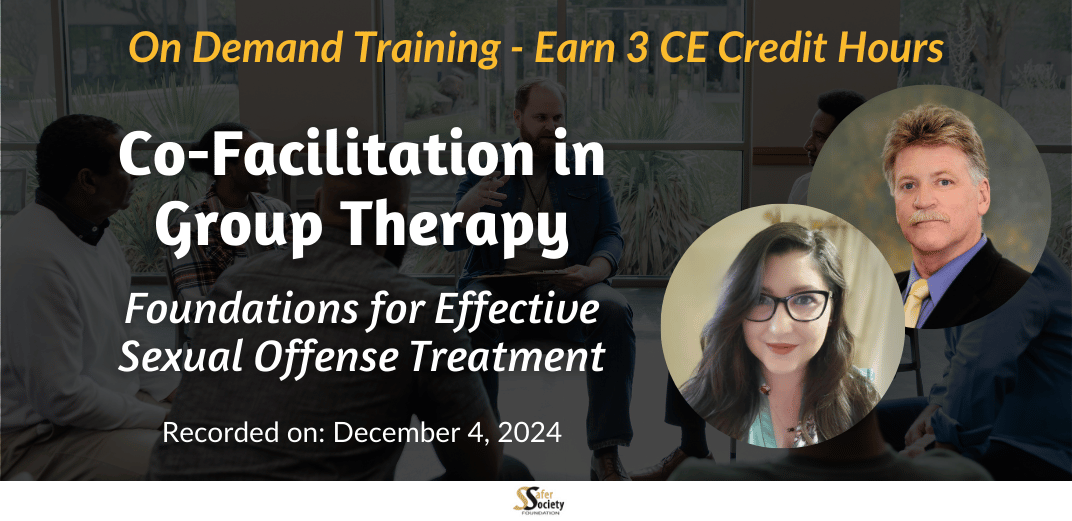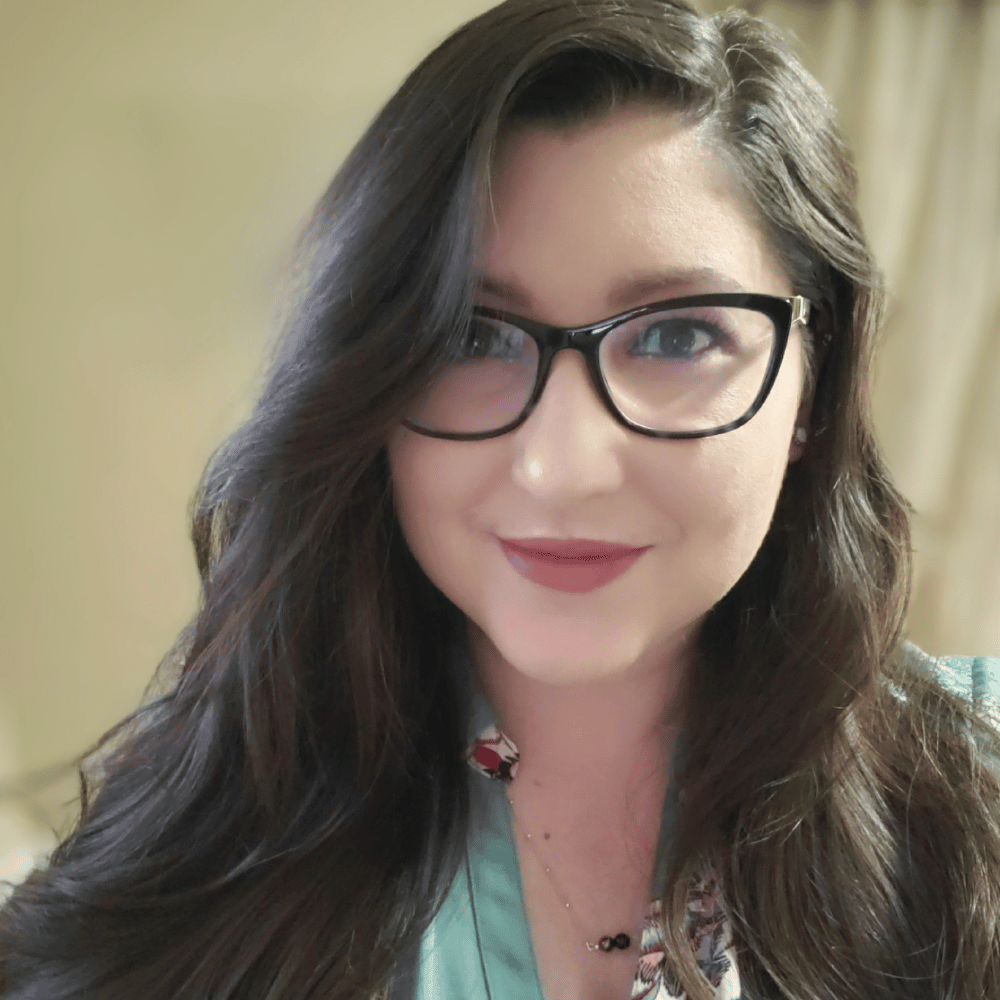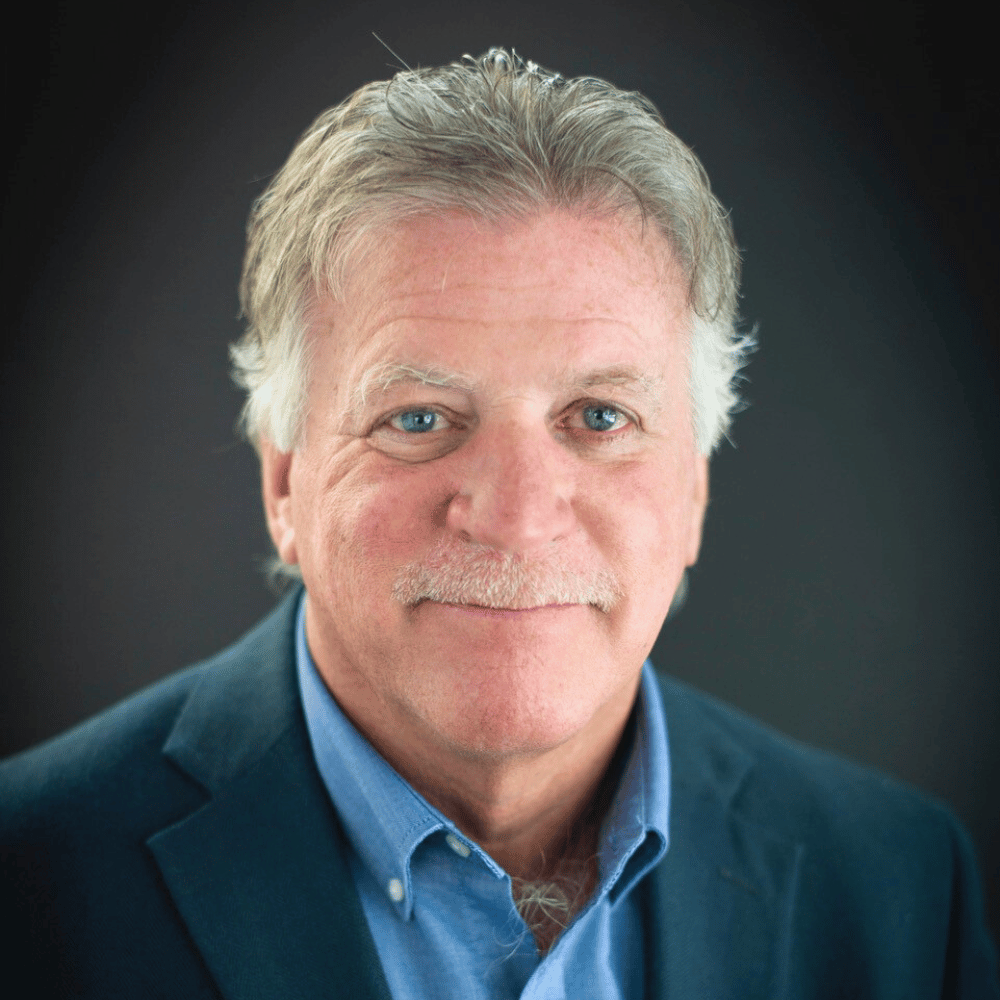
Co-Facilitation in Group Therapy: Foundations for Effective Sexual Offense Treatment
Already purchased an On Demand training?
Click here to access your Safer Society On-Demand Training Center account.
Group therapy is the primary modality used in treatment programs in North America for those who have committed a sexual offense. Although not always possible within the constraints of programs, the preferred method of delivering group therapy is with two mental health professionals through co-facilitation. Co-facilitation can improve group therapy—and therefore help to prevent further harm—in a number of ways:

- Diverse perspectives: Two facilitators can offer different viewpoints and approaches to treatment, enriching the group experience.
- Improved management: Co-facilitators can better handle challenging situations and group dynamics, ensuring smoother sessions.
- Modeling healthy relationships: The interaction between co-facilitators can demonstrate positive communication and problem-solving skills to group members.
- Enhanced group cohesion: The collaborative relationship between co-facilitators can foster a sense of teamwork within the group.
Research and practical experience have found that the use of co-facilitation is highly beneficial for both the facilitators and the group members. However, there are consequences when the co-facilitator relationship is not well developed in and outside of the group setting.
This training summarizes the origins of co-facilitation, its benefits, and the issues and opportunities of it with those who have sexually abused. Ms. Crowder and Mr. Sawyer, two established experts in group therapy, highlight common mistakes among co-facilitators and considerations for developing the most effective relationships. They also discuss the research behind its effectiveness and ways in which this relationship can be improved to further expand the growth and progress of the group members.
1) Explain the importance of co-facilitation in enhancing the effectiveness of group therapy.
2) Analyze the intersection of diversity and the cofacilitator alliance and its implications for therapeutic practice.
3) Identify and prevent common mistakes in co-facilitation.
4) Explain the steps necessary for building a productive and collaborative relationship between cofacilitators.
Audience
This training is for mental health professionals such as psychologists, therapists, and counselors who work with individuals who have committed sexual offenses, as well as group therapists specifically involved in facilitating therapy sessions for this population. Additionally, correctional staff and social workers engaged in the rehabilitation and reintegration of individuals who have sexually offended will benefit from the insights provided.
Content Level
Disclosure
Continuing Education Approval
American Psychological Association (APA)
Safer Society Foundation, Inc. is approved by the American Psychological Association (APA) to sponsor continuing education for psychologists. Safer Society Foundation, Inc. maintains responsibility for this program and its content.
Who's Presenting

Brenda Blanchard Crowder, LPC, CSOTP
Brenda Blanchard Crowder, LPC, CSOTP has had an interest in working with the forensic population clinically since high school. With this passion and drive, she eventually studied at and graduated with two Master’s degrees in Clinical Mental Health Counseling and Forensic & Legal Psychology from Marymount University in 2018. Upon graduation, she went to work for the Virginia Center for Behavioral Rehabilitation (VCBR) as a Psychology Associate II. In that role, she provided psychotherapeutic and psychoeducation to civilly committed Sexually Violent Predators (SVP’s) for approximately four years, attaining her CSOTP and LPC during this time. In October 2022, she was promoted to Counselor II Supervisor and the only treatment supervisor in the training role. She is responsible for the recruitment, training, and retention of the treatment department. As such, she provides training of VCBR’s treatment program and ensures current treatment staff understands their role and sex offender specific concepts.

Steven Sawyer, MSSW, LICSW, ATSA-F
Steven Sawyer, MSSW, is a Licensed Independent Clinical Social Worker and is founder and President of Sawyer Solutions, LLC, a private clinical and consulting practice. He was a founding board member and Executive Director of a local non-profit treatment agency in Minnesota where he served for 17 years, a founding board member and past chapter president of the Minnesota Chapter of the Association for the Treatment of Sexual Abusers (MNATSA), a past board member of ATSA, and is a past board member and chair of the Minnesota Board of Social Work. He currently provides clinical and consultation services to individuals, families and organizations. He serves as a consultant to catholic religious orders on matters of sexual abuse prevention, and management and personnel issues, and provides clinical supervision services for State employees. He has given lectures and trainings locally and nationally to public and professional groups about sexual offender treatment and sexual abuse prevention. He has published more than 18 articles and book chapters on a program for men who use prostitutes, sexual abuse in the Catholic Church, group therapy with adults who sexually offend, sex dysfunction in sex offenders, and treatment program outcome research. Over the past 33 years he has facilitated or observed more than 4000 hours of group therapy, has assessed and treated hundreds of men who have committed sexual crimes, and has supervised the treatment of several thousand men in sexual offender treatment.
